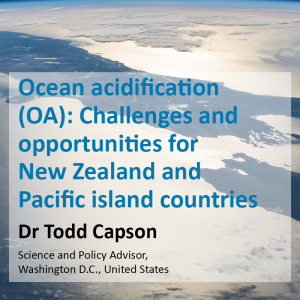Each day during the month of April, the Institute will feature one of the 30 ‘perspectives’ from the One Ocean report. These short articles include a diverse range of views regarding oceans management in New Zealand. Enjoy!
Today:
Dr Todd Capson, Science and Policy Advisor, Washington D.C.
Ocean acidification (OA): Challenges and opportunities for New Zealand and Pacific island countries
Ocean acidification (OA) is a consequence of rising CO2 levels, which are increasing the acidity of seawater. OA removes carbonate ions needed by organisms such as corals, shellfish and small organisms that underpin key marine food webs.Rising acidity has been shown to have profound impacts in some fishes. In effect, humans are conducting an unprecedented experiment in the Earth’s history, and unless decisive measures are taken soon, the impacts will likely be profound and irreversible on time frames relevant to human societies. Globally, OA is driven by CO2 emissions, but in coastal areas, local drivers such as nutrients from agriculture, can contribute to acidification. The successful management of these drivers can reduce local acidification and strengthen the natural resilience of coastal ecosystems against stressors such as climate change,overfishing and pollution.
New Zealand waters are acidifying at a rate consistent with global averages and studies confirm potential impacts on food webs, habitats and species of great ecological and commercial importance. While OA does not yet appear to have impacted New Zealand’s coastal ecosystems,some in government, industry and academia are taking a proactive approach to monitor and address OA. On a regional scale, New Zealand is working in partnership with the U.S., Samoa and the Cook Islands to build a network dedicated to OA monitoring and adaptation in the Southwest Pacific. This programme will strengthen capacity to monitor and respond to OA, help future-proof vulnerable industries and provide a model for other countries. The information obtained will inform management decisions on local, national and international levels and add influential voices to the calls for reduced CO2 emissions.






















![20160906 McGuinness Institute - TacklingPovertyNZ Workshop – Far North Flyer [FINAL]](/wp-content/uploads/20160906-McGuinness-Institute-TacklingPovertyNZ-Workshop-%E2%80%93-Far-North-Flyer-FINAL-1-50x50.png)